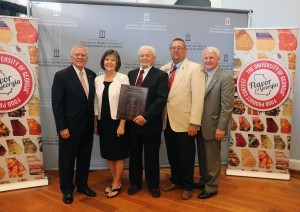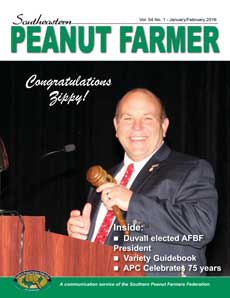
Georgia Farmer of the Year for 2016, John McCormick and his wife Paula McCormick, accept his award from Gov. Nathan Deal. Screven County Extension Coordinator Ray Hicks and Georgia House Majority Leader, Rep. Jon Burns, are on hand to congratulate them. Image credit: Merritt Melancon.
For John McCormick, farming is a tradition. His ability to help his farm evolve over the years earned him the title of “Georgia Farmer of the Year.”
The Sylvania, Georgia, corn, peanut and soybean farmer was in Atlanta, Georgia, this week to be honored by Gov. Nathan Deal as part of Deal’s Ag Awareness Day at the Georgia Capitol. McCormick’s wife, Paula, and their four sons and daughters-in-law were on hand as well.
McCormick will represent Georgia at the Sunbelt Ag Expo in Moultrie, Georgia, in October, when the Swisher Sweets/Sunbelt Expo Southeastern Farmer of the Year award is presented.
Ray Hicks, University of Georgia Cooperative Extension coordinator for Screven County, nominated McCormick, who pioneered the use of new technologies, like GPS-guided machinery and variable-rate irrigation, in southeast Georgia.
“He is a very diversified farmer who has used modern technology to help improve the profitability and sustainability of this farm. (He’s used) variable-rate irrigation and GPS on his tractor and has adopted conservation tillage on his land,” Hicks said.
McCormick started farming with his father as a child, but he didn’t decide it was how he wanted to spend his life until high school, when he undertook a series of projects through Georgia 4-H.
His father allowed him to use part of his land for the 4-H projects, and he learned to love the experimental nature of farming — trying new things and seeing if they would improve his crop.
Over his 42-year career, McCormick has never stopped experimenting and trying to make his operation better. Starting in 1974 as a Bulloch County, Georgia, tobacco farmer, he has diversified his crops and embraced new technologies that have allowed him to improve his yields with fewer resources and to care for the land.
Over the years he also raised swine and cattle, but he was able to change directions when those parts of the farming business no longer made sense, said Mark McCann, UGA College of Agricultural and Environmental Sciences assistant dean for Extension.
“Helping your farm evolve doesn’t just mean taking on the newest technology and techniques; it’s also the ability to let things go,” said McCann, who worked with McCormick during the late 1980s. “People sometimes have a harder time with that than with adopting the new stuff. The thing about John is that he hasn’t allowed himself to be tied down. It’s not always been about the adoption of new technology, but it’s about the strategy of how he defines his farm.”
Over the years, McCormick’s focus has been on improving the efficiency and sustainability of his farm and leaving his land in better shape than it was when he bought it.
“(Our goal is) to reduce erosion, improve soil health and use the latest, best management practices that are available and applicable,” McCormick wrote. “Due to ongoing research, the goals have evolved through the years and will continue to change as research unveils new ways to improve soil health and produce more crops with higher yields on less acreage.”
Through research partnerships with UGA Extension and several agricultural supply companies, McCormick works to provide better farming methods not only for himself, but for other southeast Georgia farmers as well.
“I guess you could say that I could write a book on the reasons why I farm,” McCormick wrote. “The love the land, nature and all of the challenges that farming brings each and every day — (these) are just a few reasons that I chose farming for me and my family.”
By Merritt Melancon, University of Georgia

 Auburn University alumnus Paul Patterson has been named dean of the College of Agriculture and director of the Alabama Agricultural Experiment Station, effective immediately. Patterson has served as associate dean for instruction in Auburn’s College of Agriculture for almost seven years.
Auburn University alumnus Paul Patterson has been named dean of the College of Agriculture and director of the Alabama Agricultural Experiment Station, effective immediately. Patterson has served as associate dean for instruction in Auburn’s College of Agriculture for almost seven years. Samuel Pardue, a noted poultry science researcher and administrator at North Carolina State University, has been named dean and director of the University of Georgia’s College of Agricultural and Environmental Sciences.
Samuel Pardue, a noted poultry science researcher and administrator at North Carolina State University, has been named dean and director of the University of Georgia’s College of Agricultural and Environmental Sciences.


